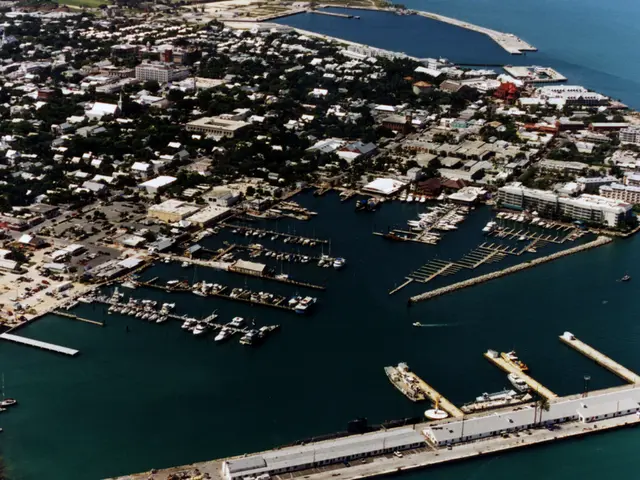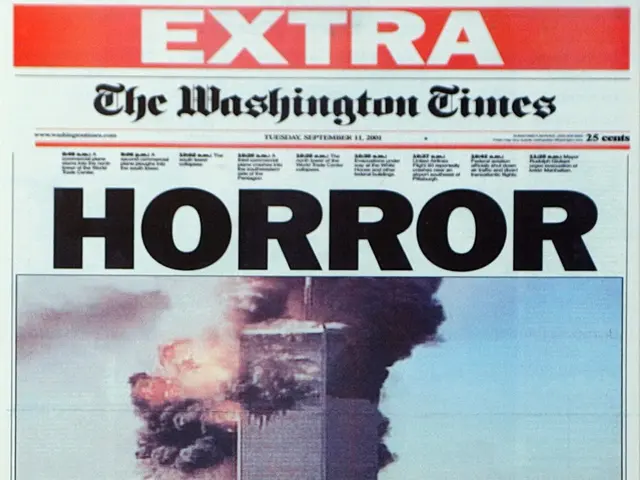Potential Israeli takeover of Gaza City: Exploring potential outcomes
Israel's decision to expand its military operation in the Gaza Strip aims to dismantle Hamas, free remaining hostages, and establish control over Gaza City, but it carries profound implications.
Impact on Population
The expansion will likely exacerbate the humanitarian crisis for Gaza's civilians. Prior operations have already caused massive civilian casualties (over 61,000 killed and hundreds of thousands injured), extensive destruction of infrastructure (70% destroyed), and a collapse of healthcare and food security. Nearly 90% of Gaza's population is displaced and faces acute food insecurity. Further ground operations risk forcing more Gazans to flee, increasing deaths, and worsening shortages of essential supplies, as humanitarian aid access remains restricted under blockade conditions and fears of aid workers' safety persist.
Hostages
The operation focuses on areas believed to contain the remaining hostages (about 20 reportedly alive). However, military officials and hostage families warn that intensified fighting could endanger these lives. IDF Chief of Staff Eyal Zamir has cautioned that the plan risks hostage safety. Hostage release is a declared priority by Prime Minister Netanyahu, but the operational risks are significant.
International Community
The decision has drawn sharp condemnation from multiple European countries and calls for Israel to reverse its expansion to avoid further civilian harm and violations of international humanitarian law. A joint statement by Denmark, France, Greece, Slovenia, and the UK called the escalation a threat to civilians and hostages and urged caution. The humanitarian community faces heightened challenges amid ongoing targeting of medical and aid workers and restrictions on aid materials.
Political Landscape in Israel
The operation reflects a firm stance linked to Prime Minister Netanyahu's "five principles" aiming to disarm Hamas, free hostages, demilitarize Gaza, assert Israeli security control, and establish a non-hostile civilian administration. Yet, this approach exposes political rifts, including between the government and the IDF leadership wary of overstretched military forces and increased risks to troops and hostages. Rising public protests within Israel also indicate domestic instability and fatigue with the prolonged conflict.
In summary, while Israel's expanded military operation intends to neutralize Hamas and secure hostages, it carries grave consequences for Gaza's civilian population, risks to hostage lives, strains Israel's internal political unity, and provokes international criticism focused on humanitarian and legal concerns.
Notable Points
- The city of Gaza, which is not yet under Israeli control, has a population of around 700,000 people.
- The residents are to be evacuated to refugee camps in the center of the Gaza Strip, which are already overcrowded and have health-threatening conditions.
- There are still 50 hostages in Gaza, with 20 believed to still be alive.
- The conquest is expected to lead to the flight of many more people from the city of Gaza.
- Netanyahu stated that Israel wants to take control of the entire Gaza Strip but not permanently occupy it.
- The potential conquest of further areas has caused fears among the Palestinian population of a new wave of flight and expulsion.
- The humanitarian situation in the Gaza Strip is described as catastrophic, with a famine threatening in the region.
- Criticism of Israel's actions in the Gaza Strip has increased significantly internationally, with some countries considering sanctions against Israel.
- EU Commission President Ursula von der Leyen has also called on Israel to question a further military escalation in the Gaza Strip.
- The shock in Israeli society over fallen soldiers this year could be further undermined by further losses on the Israeli side.
- Israel's security cabinet has decided to expand its military operation in the Gaza Strip, with the aim of gaining full control of the coastal region.
- The military currently controls around 75 percent of the Gaza Strip's area.
- The city of Gaza has been a target of several Israeli attacks since the start of the war around 22 months ago.
- British Prime Minister Keir Starmer has urged Israel to reconsider its decision to escalate, stating it will not end the conflict or free the hostages.
- The German government has taken concrete measures against Israel for the first time, halting exports of military goods that could be used in the Gaza war.
- The recent expansion of Israel's military operation in the Gaza Strip, although primarily targeted at dismantling Hamas and freeing hostages, has provoked severe criticism from the international community, including European countries, concerning the potential harm to civilians and violations of international humanitarian law, as well as fears of a new wave of displacement and catastrophic humanitarian conditions.
- As Israel aims to establish control over Gaza City and secure the release of hostages, it is essential to consider the political ramifications within Israel itself, as this operation reflects divisions between the government and IDF leadership over military strategy, troop safety, and the broader political landscape that has been affected by the prolonged conflict, discord, and public protests evident within Israeli society.








